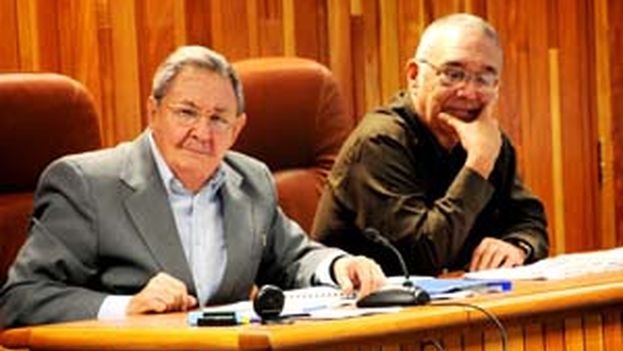
![]() 14ymedio, Marcelo Hernandez, Havana, 3 March 2017 — The role of information technology as a “weapon for the defense of the Revolution” has grabbed the attention of the latest meeting of the Council of Ministers, held several weeks late this Tuesday in the Palace of the Revolution and headed by President Raul Castro.
14ymedio, Marcelo Hernandez, Havana, 3 March 2017 — The role of information technology as a “weapon for the defense of the Revolution” has grabbed the attention of the latest meeting of the Council of Ministers, held several weeks late this Tuesday in the Palace of the Revolution and headed by President Raul Castro.
During the meeting, policies were approved for the improvement of the system of standardization, measurement, quality and accreditation, as well as fishing and food safety. But the leading role was taken by Information and Communication Technologies, whose shortcomings were expressed by General Leonardo Andollo Valdés, who is in charge of the Commission for the Implementation and Development of Improvement of the Economic and Social Model.
The military man stressed that “different actions have been undertaken for the regulation of computerization in the country, however, a comprehensive policy is required.” He called for the creation of content aimed at “strengthening the identity and preserving the values of Cuban society.”
At a time when new technologies are gaining a presence among the population, the Government is still cautious about defining protocols for computerizing activities of daily life. Doing legal paperwork on the internet, or reserving a ticket, or taking money out of an ATM, are all tasks that continue to be surrounded by complexities.
Andollo said that conditions will be created to facilitate both communication between government institutions and procedures for the population
Andollo said that conditions will be created to facilitate both communication between government institutions and procedures for the population. Citizens have insisted on the need for these improvements, since it is not comprehensible that in such a centralized state, many procedures must be pursued separately with each entity.
On the other hand, while official reluctance remains, alternative distribution networks have a wide assortment of devices, content and “tricks” – such as NanoStations, Bullets, Rockets or Routers – to take advantage of global developments in technology. On the streets of Cuba, the most sophisticated smartphones coexist with the stories of those who still haven’t been able to afford their first cellphone.
The ministers met the day before the announcement of the prices of Nauta Home, a service that provides Internet browsing from homes. After a pilot test that included 2,000 homes in Havana’s historic center, the Telecommunications Company (ETECSA) announced the fees for the service, which range from 15 to 115 Convertible Cuban pesos (CUC) for 30 hours of connection. The available speeds start at 128 kilobytes and range up to 2 megabytes.
